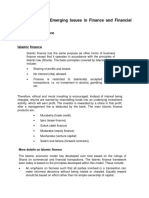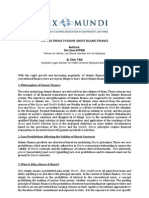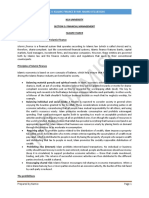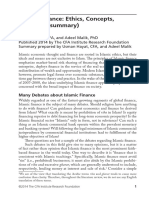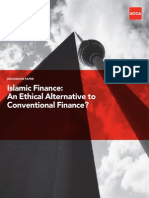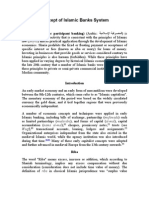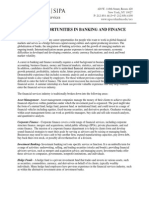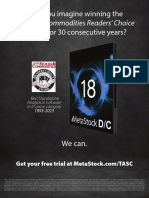Application For Appearance
Application For Appearance
Uploaded by
Aakash BhurgriCopyright:
Available Formats
Application For Appearance
Application For Appearance
Uploaded by
Aakash BhurgriOriginal Description:
Original Title
Copyright
Available Formats
Share this document
Did you find this document useful?
Is this content inappropriate?
Copyright:
Available Formats
Application For Appearance
Application For Appearance
Uploaded by
Aakash BhurgriCopyright:
Available Formats
Islamic Finance
Financing activities that must comply with Sharia (Islamic Law)
What is Islamic Finance?
The rules governing Islamic Finance are derived from the Shari'ah. The Shari'ah is a
framework of Islamic Jurisprudence derived from the primary sources: The Qur'an
and the teachings of the Prophet Muhammad (pbuh) known as the Sunnah. In addition
to which there is a dynamic secondary source of common law rulings and scholarly
interpretations referred to as Fatwa's. These fatwas are the results of human
interpretation of the Shari' ah, of its texts, or its principles, or a combination of the
two; they are not the word of God. Islamic law, it must be remembered, is more a
process than a code, and the results of legal deliberations may differ when different
methods are employed. Several fatwas are indicative of an acceptance on the part of
Shari'ah Supervisory Boards of new realities in the marketplace and of their
willingness to understand and work with these to the extent that Islamic religious and
legal principles will allow. Such an attitude has ever characterized the best in Islamic
legal thought.
Islamic finance is a type of financing activity that must comply with Sharia
(Islamic Law). The concept can also refer to the investments that are
permissible under Sharia.
entral to Islamic finance is the fact that money itself has no intrinsic value.
As a matter of faith, a Muslim cannot lend money to, or receive money
from someone and expect to benefit – interest (known as riba) is not
allowed. To make money from money is forbidden – wealth can only be
generated through legitimate trade and investment in assets. Money must
be used in a productive way. In order to be Sharia compliant, money must
be used in a productive way.
The common practices of Islamic finance and banking came into existence
along with the foundation of Islam. However, the establishment of formal
Islamic finance occurred only in the 20th century. Nowadays, the Islamic
finance sector grows at 15%-25% per year, while Islamic financial
institutions oversee over $2 trillion.
The main difference between conventional finance and Islamic finance is
that some of the practices and principles that are used in conventional
finance are strictly prohibited under Sharia laws.
Principles of Islamic Finance
Islamic finance strictly complies with Sharia law. Contemporary Islamic
finance is based on a number of prohibitions that are not always illegal in
the countries where Islamic financial institutions are operating:
1. Paying or charging an interest
Islam considers lending with interest payments as an exploitative practice
that favors the lender at the expense of the borrower. According to Sharia
law, interest is usury (riba), which is strictly prohibited.
2. Investing in businesses involved in prohibited activities
Some activities, such as producing and selling alcohol or pork, are
prohibited in Islam. The activities are considered haram or forbidden.
Therefore, investing in such activities is likewise forbidden.
3. Speculation (maisir)
Sharia strictly prohibits any form of speculation or gambling, which is
called maisir. Thus, Islamic financial institutions cannot be involved in
contracts where the ownership of goods depends on an uncertain event in
the future.
4. Uncertainty and risk (gharar)
The rules of Islamic finance ban participation in contracts with excessive
risk and/or uncertainty. The term gharar measures the legitimacy of risk or
uncertainty in investments. Gharar is observed with derivative
contracts and short-selling, which are forbidden in Islamic finance.
In addition to the above prohibitions, Islamic finance is based on two other
crucial principles:
Material finality of the transaction: Each transaction must be
related to a real underlying economic transaction.
Profit/loss sharing: Parties entering into the contracts in Islamic
finance share profit/loss and risks associated with the transaction. No
one can benefit from the transaction more than the other party.
Types of Financing Arrangements
Since Islamic finance is based on several restrictions and principles that do
not exist in conventional banking, special types of financing arrangements
were developed to comply with the following principles:
1. Profit-and-loss sharing partnership (mudarabah)
Mudarabah is a profit-and-loss sharing partnership agreement where one
partner (financier or rab-ul mal) provides the capital to another partner
(labor provider or mudarib) who is responsible for the management and
investment of the capital. The profits are shared between the parties
according to a pre-agreed ratio.
2. Profit-and-loss sharing joint venture (musharakah)
Musharakah is a form of a joint venture where all partners contribute
capital and share the profit and loss on a pro-rata basis. The major types of
these joint ventures are:
Diminishing partnership: This type of venture is commonly used to
acquire properties. The bank and investor jointly purchase a property.
Subsequently, the bank gradually transfers its portion of equity in the
property to the investor in exchange for payments.
Permanent musharkah: This type of joint venture does not have a
specific end date and continues operating as long as the participating
parties agree to continue operations. Generally, it is used to finance
long-term projects.
3. Leasing (Ijarah)
In this type of financing arrangement, the lessor (who must own the
property) leases the property to the lessee in exchange for a stream of rental
and purchase payments, ending with the transfer of property ownership to
the lessee.
Investment Vehicles
Due to the number of prohibitions set by Sharia, many conventional
investment vehicles such as bonds, options, and derivatives are forbidden
in Islamic finance. The two major investment vehicles forbidden in Islamic
finance.
1. Equities
Sharia allows investment in company shares. However, the companies must
not be involved in the activities prohibited by Islamic laws, such as lending
at interest, gambling, production of alcohol or pork. Islamic finance also
allows private equity investments.
2. Fixed-income instruments
Since lending with interest payments is forbidden by Sharia, there are no
conventional bonds in Islamic finance. However, there is an equivalent of
bonds called sukuk or “Sharia-compliant bonds.” The bonds represent
partial ownership in an asset, not a debt obligation.
Conclusion
Islamic finance as it exists today has been shown to reduce
economic efficiency by increasing transaction costs, without
providing any substantial economic value to its customers. Many
have argued that the industry is actually demand driven, and hence
jurists and lawyers engaged in Shariʿa arbitrage provide value, by
bringing conventional financial products to a market segment that
would not have access otherwise. Thus, proponents of that
argument assert, Shariʿa-arbitrage mechanisms should be seen as
enabling juristic efforts to recharacterize modern financial
transactions (takhrij fiqhi), rather than legal stratagems to
circumvent prohibitions (hiyal Sharʿiyya). Moreover, the argument
continues, to the extent that Islamic legal restrictions have
economic content, the gradual progress of Islamic finance toward
increasingly more efficient and more authentically Islamic
products will eventually allow the industry to serve the Islamic
ideal.
In fact, however, Islamic finance has been largely a supply-driven
industry, with jurists who participate actively in Shariʿa arbitrage
helping to expand the industry's customer base through indirect
advertisement (at various conferences and publications), as well as
religious admonishment that Muslims should avoid conventional
finance. The form-above-substance juristic approach to Shariʿa
arbitrage has also been shown to squander the prudential
regulatory content of premodern Islamic jurisprudence, while
reducing economic efficiency for customers through spurious
transactions, not to mention legal and jurist fees.
You might also like
- FIN 301 SyllabusDocument9 pagesFIN 301 SyllabusAnh NguyenNo ratings yet
- Concept PaperDocument5 pagesConcept PaperRyan Bianet CosicolNo ratings yet
- Commission AgreementDocument3 pagesCommission AgreementJay-ar Dela Cruz100% (1)
- Comparative Analysis of Engro Fertilizers Limited & Fauji Fertilizers Company LimitedDocument34 pagesComparative Analysis of Engro Fertilizers Limited & Fauji Fertilizers Company LimitedShahzaib SubhaniNo ratings yet
- Islamic Finance - Principles and Types of Islamic FinanceDocument4 pagesIslamic Finance - Principles and Types of Islamic Financebharatjha1732002No ratings yet
- Islamic BankingDocument5 pagesIslamic BankingMahNoor AwanNo ratings yet
- Islamic InstrumentsDocument7 pagesIslamic InstrumentslekshmiNo ratings yet
- "Shari'a", and The Exact Literal Translation of "Shari'a" Is "A Clear Path To Be Followed andDocument7 pages"Shari'a", and The Exact Literal Translation of "Shari'a" Is "A Clear Path To Be Followed andJohn Marc ChullNo ratings yet
- Islamic FinanceDocument3 pagesIslamic FinanceKiran KumarNo ratings yet
- Islamic FinanceDocument26 pagesIslamic FinanceAGBA NJI THOMASNo ratings yet
- What Is Islamic BankingDocument5 pagesWhat Is Islamic BankingUmar yuguda MuhammadNo ratings yet
- An Introduction To Islamic FinanceDocument14 pagesAn Introduction To Islamic FinanceThargistNo ratings yet
- Principle Sources of Islamic BankingDocument4 pagesPrinciple Sources of Islamic BankingNahin Ibn ZamanNo ratings yet
- Discussion and RecommendationDocument8 pagesDiscussion and RecommendationNuranis QhaleedaNo ratings yet
- Top Ten - Islamic FinanceDocument4 pagesTop Ten - Islamic Financesadique_homeNo ratings yet
- Working With Islamic FinanceDocument35 pagesWorking With Islamic Finance143roshanNo ratings yet
- 10 DecemberDocument3 pages10 DecemberMaryam LaraibNo ratings yet
- Islamic Banking Theories and PracticesDocument13 pagesIslamic Banking Theories and PracticesUzmanNo ratings yet
- Islamic Finance HistoryDocument3 pagesIslamic Finance HistoryAbdul HayeeNo ratings yet
- Islamic Finance IntroductionDocument5 pagesIslamic Finance Introductioneshaal naseemNo ratings yet
- Roles of Shariah Board in Islamic BankDocument6 pagesRoles of Shariah Board in Islamic BankAbu Sajeeha Muhammath RimsanNo ratings yet
- Islamic Finance NotesDocument6 pagesIslamic Finance NotesHosea KanyangaNo ratings yet
- The Islamic Financial SystemDocument22 pagesThe Islamic Financial Systemsollooysaa.liqimsooNo ratings yet
- Working With Islamic FinanceDocument3 pagesWorking With Islamic FinanceNaffay HussainNo ratings yet
- Assignment On Islamic BankingDocument8 pagesAssignment On Islamic BankingRimsha LatifNo ratings yet
- IBF 505 Criticism Against Islamic Banking - 50807Document18 pagesIBF 505 Criticism Against Islamic Banking - 50807Muhammad UsmanNo ratings yet
- Assignment - Abdulrahman - Islamic Trading FinanceDocument7 pagesAssignment - Abdulrahman - Islamic Trading FinanceEmad Uddin ShahidNo ratings yet
- Sana Islamic LawDocument7 pagesSana Islamic LawArslan MalikNo ratings yet
- RFLR v9 n3 1Document6 pagesRFLR v9 n3 1Yousef AbuhejlehNo ratings yet
- Project IBF Submitted To: DR. Sabeen Khurram KhanDocument7 pagesProject IBF Submitted To: DR. Sabeen Khurram KhanSheikh AbdullahNo ratings yet
- Sukuk 6Document22 pagesSukuk 6salahhamoudaNo ratings yet
- Revised Chapter 2Document44 pagesRevised Chapter 2kellydaNo ratings yet
- What Is Islamic Finance?: Faleel JamaldeenDocument9 pagesWhat Is Islamic Finance?: Faleel JamaldeenanggiNo ratings yet
- IB - A New Era of FinancingDocument22 pagesIB - A New Era of FinancingMoNa AlamgirNo ratings yet
- Philosophy of Islamic Banking and FinanceDocument9 pagesPhilosophy of Islamic Banking and FinanceNabeela ShahNo ratings yet
- Principles of Islamic FinanceDocument5 pagesPrinciples of Islamic Financemr basitNo ratings yet
- Fin546 Article ReviewDocument4 pagesFin546 Article ReviewZAINOOR IKMAL MAISARAH MOHAMAD NOORNo ratings yet
- Article Review ZainoorDocument6 pagesArticle Review ZainoorZAINOOR IKMAL MAISARAH MOHAMAD NOORNo ratings yet
- BM Introduction To Islamic BankingDocument3 pagesBM Introduction To Islamic BankingMd. Rakib HasanNo ratings yet
- Islamic Banking and FinanceDocument7 pagesIslamic Banking and FinanceAyesha HamidNo ratings yet
- Glossary of Islamic Finance TermsDocument4 pagesGlossary of Islamic Finance TermsElmelki AnasNo ratings yet
- Basics of Islamic BankingDocument6 pagesBasics of Islamic BankingMnk BhkNo ratings yet
- Present Practices of Islamic BankingDocument6 pagesPresent Practices of Islamic BankingAyesha HamidNo ratings yet
- Introduction To Islamic FinanceDocument2 pagesIntroduction To Islamic FinanceSara RothNo ratings yet
- Islamic Finance Effect On Public Islamic Bank BerhadDocument39 pagesIslamic Finance Effect On Public Islamic Bank BerhadHari Dass100% (1)
- Deposit Mobilization TechniquesDocument8 pagesDeposit Mobilization TechniquesFahad Bhuiyan100% (1)
- CGF ProjectDocument8 pagesCGF ProjectAvaniNo ratings yet
- Islamic Finance Acca PaperDocument6 pagesIslamic Finance Acca PaperAmmar KhanNo ratings yet
- Online Principles and Sources of Islamic InstitutionsDocument8 pagesOnline Principles and Sources of Islamic InstitutionsVeenesha MuralidharanNo ratings yet
- Islamic Finance: Key PrinciplesDocument3 pagesIslamic Finance: Key PrinciplesSimon ChawingaNo ratings yet
- Credit Operations and Risk Management in Commercial BanksDocument4 pagesCredit Operations and Risk Management in Commercial Bankssn nNo ratings yet
- Final Book..islamic Finance SystemsDocument180 pagesFinal Book..islamic Finance SystemsKansohmi KansNo ratings yet
- Concept of Islamic Banks System: Islamic banking (or participant banking) (Arabic: ةيملسسسلا ةيفرسسصملاDocument16 pagesConcept of Islamic Banks System: Islamic banking (or participant banking) (Arabic: ةيملسسسلا ةيفرسسصملاJane AlamNo ratings yet
- Islamic Finance - Relevant For ACCA Paper F9 and P4Document17 pagesIslamic Finance - Relevant For ACCA Paper F9 and P4Abigail CharlesNo ratings yet
- SSRN Id2609216Document5 pagesSSRN Id2609216ShakikNo ratings yet
- An Introduction To Islamic Finance and The Malaysian ExperienceDocument10 pagesAn Introduction To Islamic Finance and The Malaysian Experiencecharlie simoNo ratings yet
- Islamic Finance Form 3Document13 pagesIslamic Finance Form 3AbdullahiNo ratings yet
- Islamic FinanceDocument8 pagesIslamic FinanceTopmax Training CollegeNo ratings yet
- Case Study 1Document6 pagesCase Study 1Uzair KhanNo ratings yet
- Article IAS 12 Income TaxesDocument14 pagesArticle IAS 12 Income Taxessteven lino2No ratings yet
- 20 Chapter - 20 - Effective - Interest - Method PDFDocument25 pages20 Chapter - 20 - Effective - Interest - Method PDFSheila Grace Baja100% (1)
- Career Overview Banking and FinanceDocument5 pagesCareer Overview Banking and Financesupering143No ratings yet
- Life ContingenciesDocument64 pagesLife Contingenciespedro_ladeiras4876No ratings yet
- Founder Friendly Standard Term Sheet 20200925aDocument6 pagesFounder Friendly Standard Term Sheet 20200925aAnne YipNo ratings yet
- UCITS Hedge Funds Performance Guide 2012 04Document185 pagesUCITS Hedge Funds Performance Guide 2012 04NaisscentNo ratings yet
- Accounting Principles Chapter OneDocument23 pagesAccounting Principles Chapter OneYyhh100% (1)
- Partnerships: Liquidation: Mcgraw-Hill/IrwinDocument63 pagesPartnerships: Liquidation: Mcgraw-Hill/IrwinAmer Wagdy GergesNo ratings yet
- Write Your Business Plan.: WWW - Teneric.co - UkDocument5 pagesWrite Your Business Plan.: WWW - Teneric.co - Uk6062No ratings yet
- Introduction To Macroeconomics: Unit 1Document178 pagesIntroduction To Macroeconomics: Unit 1Navraj BhandariNo ratings yet
- Amc CDPDocument180 pagesAmc CDPStela PatelNo ratings yet
- Chapter 4 - Recording and Summarizing TransactionsDocument56 pagesChapter 4 - Recording and Summarizing Transactionsshemida60% (5)
- Statement Ending 19/08/2022: Summary of AccountsDocument2 pagesStatement Ending 19/08/2022: Summary of Accountsmohamed elmakhzniNo ratings yet
- A Review of Blockchain in Fintech: Taxonomy, Challenges, and Future DirectionsDocument52 pagesA Review of Blockchain in Fintech: Taxonomy, Challenges, and Future DirectionsHiếu Nguyễn MinhNo ratings yet
- How To Survive Financially As A Single Mom - Clever Girl FinanceDocument27 pagesHow To Survive Financially As A Single Mom - Clever Girl FinanceBarely LegalNo ratings yet
- Syllabus ObliconDocument5 pagesSyllabus ObliconPat TrickNo ratings yet
- A Conceptual Study On Investment Pattern Followed by Salaried WomenDocument4 pagesA Conceptual Study On Investment Pattern Followed by Salaried WomenEditor IJTSRDNo ratings yet
- Managerial Accounting Term Paper Sta. Lucia Land, Inc.Document23 pagesManagerial Accounting Term Paper Sta. Lucia Land, Inc.Joan BasayNo ratings yet
- Chapter 15 Using Management and Accounting InformationDocument22 pagesChapter 15 Using Management and Accounting InformationPete JoempraditwongNo ratings yet
- 1.6 Definition of Terms 1.6.1 Business A Business Is An Organization or Enterprising Entity Engaged inDocument2 pages1.6 Definition of Terms 1.6.1 Business A Business Is An Organization or Enterprising Entity Engaged inمحمد أمير لقمانNo ratings yet
- Crabel Opening Range Breakout 1 - V06 - C09 - PLAYINGDocument12 pagesCrabel Opening Range Breakout 1 - V06 - C09 - PLAYINGJoseph WestNo ratings yet
- FCI - GST - Manual On Returns and PaymentsDocument30 pagesFCI - GST - Manual On Returns and PaymentsAmber ChaturvediNo ratings yet
- Lecture Note (Acc214) Pad 2023Document4 pagesLecture Note (Acc214) Pad 2023whit.ehouseboyquantiumNo ratings yet
- DP ChargesDocument1 pageDP ChargesSubbuNo ratings yet
- Receivables HandoutsDocument5 pagesReceivables HandoutsClrk RoxassNo ratings yet
- Form 26AS: Annual Tax Statement Under Section 203AA of The Income Tax Act, 1961Document10 pagesForm 26AS: Annual Tax Statement Under Section 203AA of The Income Tax Act, 1961taxolegalNo ratings yet
- This Study Resource Was: North South UniversityDocument7 pagesThis Study Resource Was: North South UniversitycsolutionNo ratings yet








